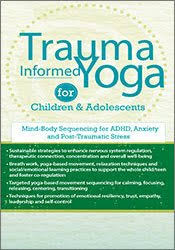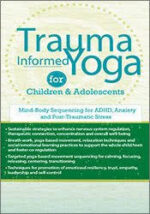Walk away feeling competent with a tool kit full of practices for calming, releasing, engaging, centering, focusing and transitioning.
Kathy Flaminio – Trauma-Informed Yoga for Children and Adolescents
Sustainable strategies to enhance nervous system regulation, therapeutic connection, concentration and overall well-being
Breath work, yoga-based movement, relaxation techniques and social/emotional learning practices to support the whole child/teen and foster co-regulation
Targeted yoga-based movement sequencing for calming, focusing, releasing, centering, transitioning
Techniques for promotion of emotional resiliency, trust, empathy, leadership and self-control
Using research and case studies for ADHD, depression, anxiety, and post-traumatic stress, you will design routines that teach:
Self-regulation
Focus
De-escalation
Overall wellbeing
Discover how to identify emotional triggers and the critical steps for how and when to use mind-body interventions. Learn common pitfalls and key strategies to implement mind-body practices such as:
Responding to body cues and matching energy levels
Understanding the population with whom you work
Honoring the cultural aspects, therapeutic setting and limitations
Walk away feeling competent with a tool kit full of practices for calming, releasing, engaging, centering, focusing and transitioning.
Apply your knowledge of trauma and mental health diagnosis to develop integrative mind-body practices.
Identify breath work techniques to enhance nervous system regulation.
Design grounding yoga techniques for post-traumatic stress.
Recognize signs of trauma (dissociation and emotional triggers) and how to intervene effectively using a mind-body approach.
Design six yoga-based sequences to promote self-regulation and social/ emotional learning.
Demonstrate the role of yoga in regaining a sense of safety in the body.
Build Trust and Safety in the Therapeutic Environment
Setting the stage for mind-body work
Do’s and don’ts for creating safe space
Experience techniques for grounding and centering
Breathing practices for calming and emotional release
Arousal-Relaxation Cycle
Disrupted attachment = dysregulated nervous system
Impact of toxic stress
Building blocks of healthy brain development
Soothing the nervous system
Modulating arousal states
Role of yoga in creating a relaxed-alert state
Regaining a sense of safety in the body
Would you like to receive Kathy Flaminio – Trauma-Informed Yoga for Children and Adolescents ?
Techniques and Case Studies to Address Stress and Trauma
Mindfulness practices for centering and connection
Diaphragmatic Breathing for soothing the nervous system
Yoga-based movement for de-escalation and developing strength
Social/emotional learning for identifying and processing feelings
Guided relaxations for emotional integration and rejuvenation
Identify Emotional Triggers
Resistance to particular poses
Holding the breath
Refusal to participate in relaxation poses
Implement Interventions
Slow down process and listen
Switch poses/ add movement
Use relaxation pose or story
Create a “let it go box”
Yoga Sequencing for ADHD, Anxiety, Depression and Post-Traumatic Stress
Calming for self-regulation and confidence
Releasing a sense of control and safety
Engaging for developing connection and support
Centering for developing a strong sense of self and awareness
Focusing for developing attention and being present
Transitioning for developing self-control and grounding








